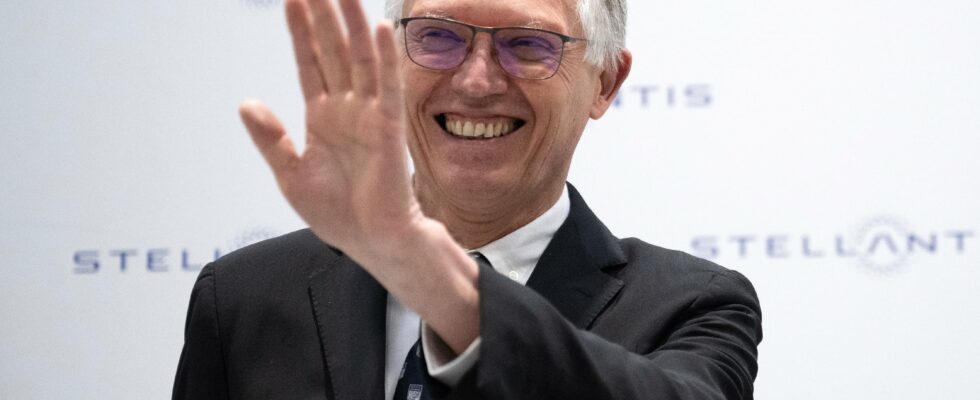Already last August, Bernard Jullien, lecturer at the University of Bordeaux, was concerned about the “long-term sustainability of the Tavares system”. The time of departure came earlier than expected for the CEO of Stellantis, at the head of the Franco-Italian-American automobile giant since 2021. Sunday, December 1, the board of directors of the manufacturer pushed him towards the release… After several years of solid performance, the group has recently seen its sales decline. Reflecting the upheavals of an increasingly fragile sector, the departure of Carlos Tavares, whose management methods have often been criticized, opens a chapter of uncertainty for the group.
L’Express: Carlos Tavares was supposed to leave the group in 2026. How can we analyze this sudden acceleration of events?
Bernard Jullien: From a managerial point of view, it is complicated to exercise full powers even when you are preparing to leave. Because obviously, the resistance capacities of subordinates are all the greater if they know that you are going to leave… At the same time, there were doubts about Carlos Tavares’ strategy for 2025 and his ability to continue to drive the boat. Before retiring, Tavares wanted to make a copy a little more in line with what he had promised a year ago, in terms of profitability. And that comes at all costs. He proposed to do “Tavares++”, that is to say to tighten all the screws, to be even harsher with suppliers, to no longer hire in the factories… It appeared as a “policy scorched earth” in the eyes of the board of directors.
Until 2023, as long as the stock price was high and dividends were coming in, there was a lot of tolerance from shareholders for Tavares’ management. Then, when his methods no longer worked, these same shareholders changed course and began to listen to those who alerted them to the fact that we were heading straight into the wall. It seems that it was rather John Elkann who changed his mind. But the Peugeots also had to validate the decision, they agreed beforehand. For the moment, this forced resignation is not validated by the Stock Exchange [NDLR : l’action a chuté de plus de 6% lundi].
The French State is a shareholder in Stellantis via Bpifrance. How to interpret his role in this departure decision?
Obviously, the BPI did not step up to oppose this departure. But they didn’t have enough weight in all cases. More generally, the State – like the unions – does not really know which way to stand in relation to Stellantis. The public authorities had much to complain about Tavares; when Bruno Le Maire asked that the electric 208, which was massively subsidized, be manufactured in France, Tavares did not react. Same when the minister advocated solidarity for the sector, Tavares did not even come to the dedicated strategic committees. So there was the feeling of a form of mistreatment; So seeing him leave wasn’t necessarily heartbreaking. But we do not really know who could be appointed now and the fear of seeing an American arrive who has little regard for French interests is great.
Despite everything, the Peugeot and Elkann may be extremely greedy financially, but they still have this long family experience and know that we cannot do without the States in the automobile sector.
What are the possible scenarios today?
There are two solutions: either we will consider that it is urgent to restore profitability and regain the double-digit margins that we had with Tavares, in which case a fairly violent rationalization plan cannot be ruled out. Either we will admit that this promise is quite crazy and that it would be more reasonable to try to regain as quickly as possible the volumes and market shares which have declined in an absolutely alarming manner.
Tavares had promised not to close factories or sacrifice brands. But these commitments date from 2019-2020 and if the first option prevailed, the leaders would have quickly reminded that the context has changed a lot since then, that we cannot persist in this objective. I wouldn’t be surprised if they sacrifice Alpha Romeo, DS or Chrysler to save the group. It therefore seems reasonable for Stellantis to be less greedy in this financial year than in 2022-2023. We must forget the crazy hope of maintaining the margins that the group experienced under Tavares.
Another challenge: they have been economical in terms of R&D and in the way of implementing electrification. As a result, their electric offers may not be as convincing as those of certain competitors. The multi-energy strategy is a little too cautious and its ability to enter the world of “all-electric” is not yet convincing.
The automobile sector is facing competition from China and a structural slowdown in the United States. How will the group be able to bounce back in this context?
The course taken under Tavares was not to oppose competition with China and to take a proactive rather than reactive approach. With the departure of Tavares, it is not certain that this course will be maintained.
For the rest, it’s really in the United States that everything will be decided: will they manage to bounce back? Stellantis is very American-dependent; in the years when the group made significant profits in Europe, it only reached 13 or 14% margins because the United States made 16%.
But some fundamentals are rather favorable. For example, unlike its competitors such as General Motors, Volkswagen, or BMW, the group’s exposure to Chinese risk has practically disappeared for Stellantis because the group no longer manufactures or sells there, whereas the competitors stubbornly defend what they have left there. If they manage to recover both in the United States and in the major European markets with their flagship brands, we can then say that the group is on a rather sustainable trajectory.
.
